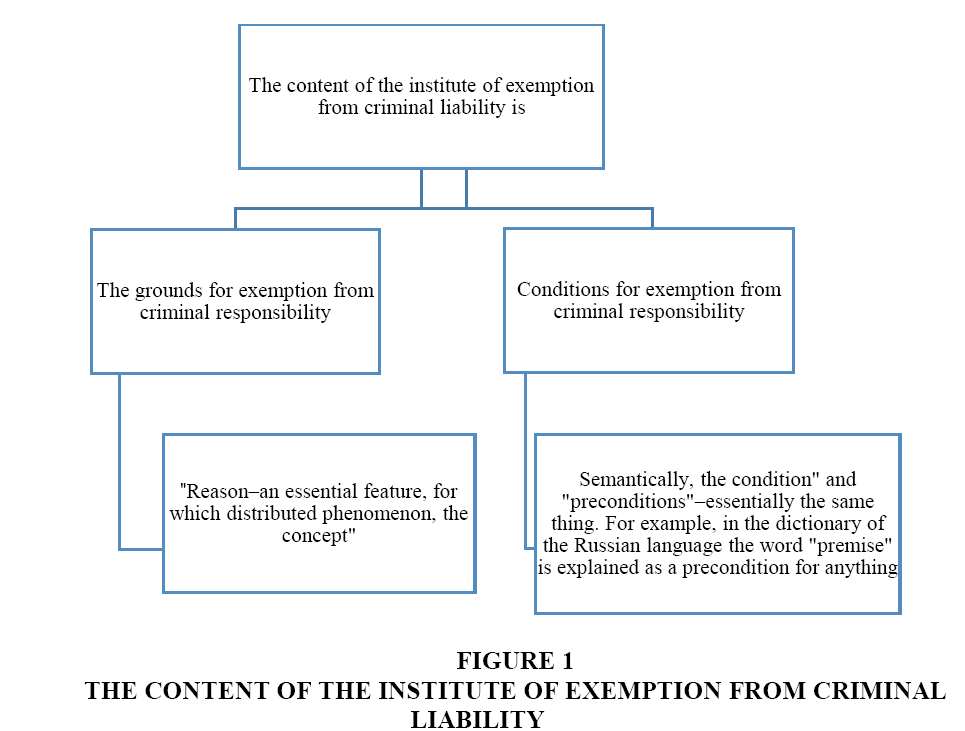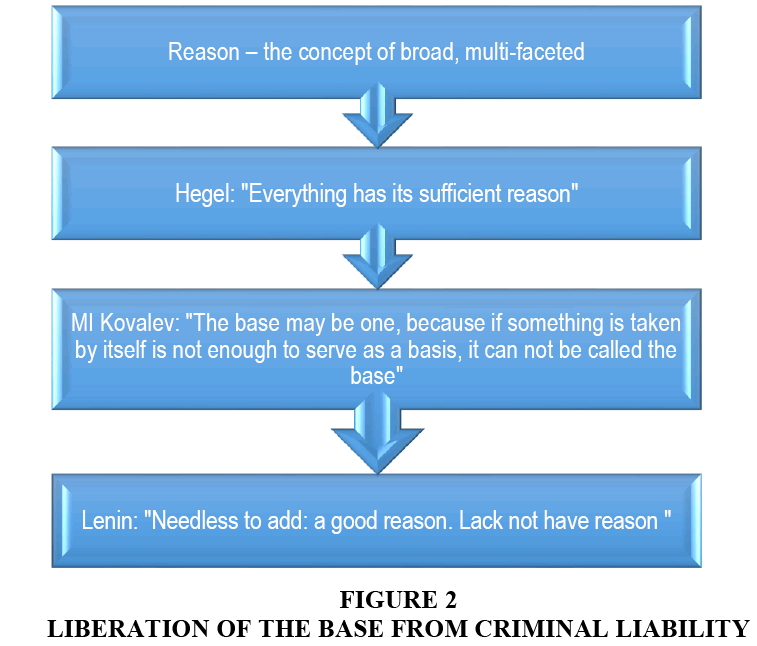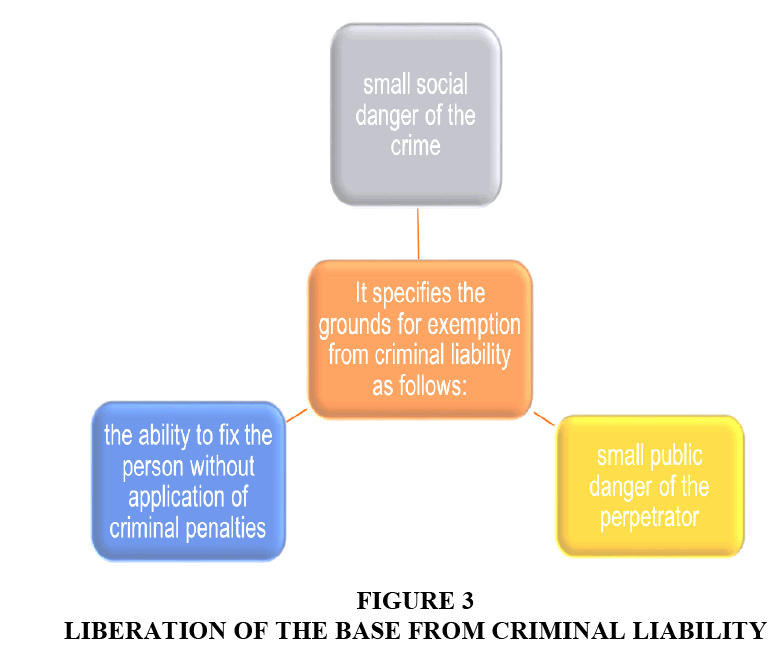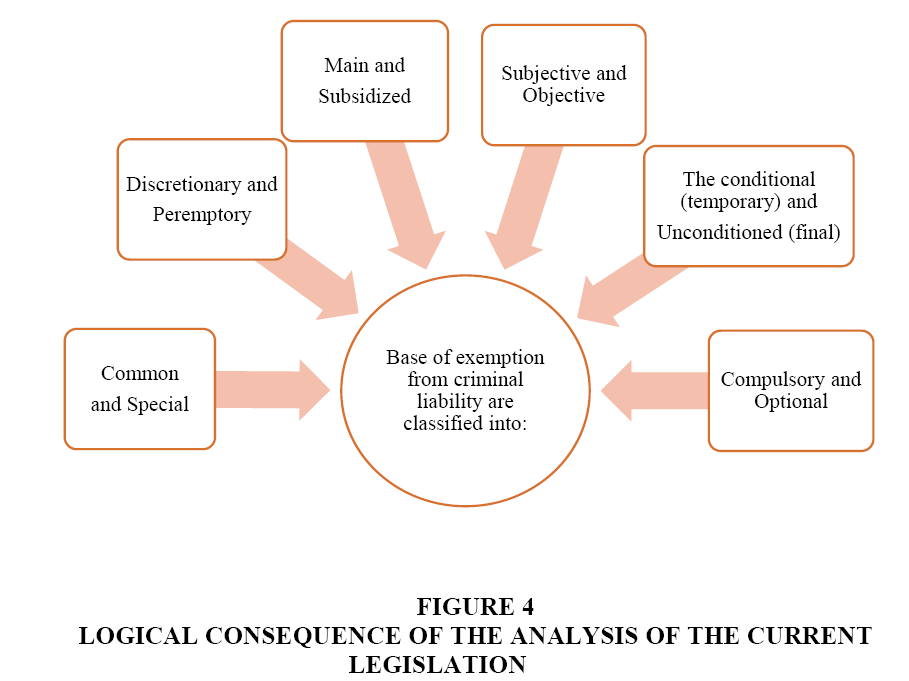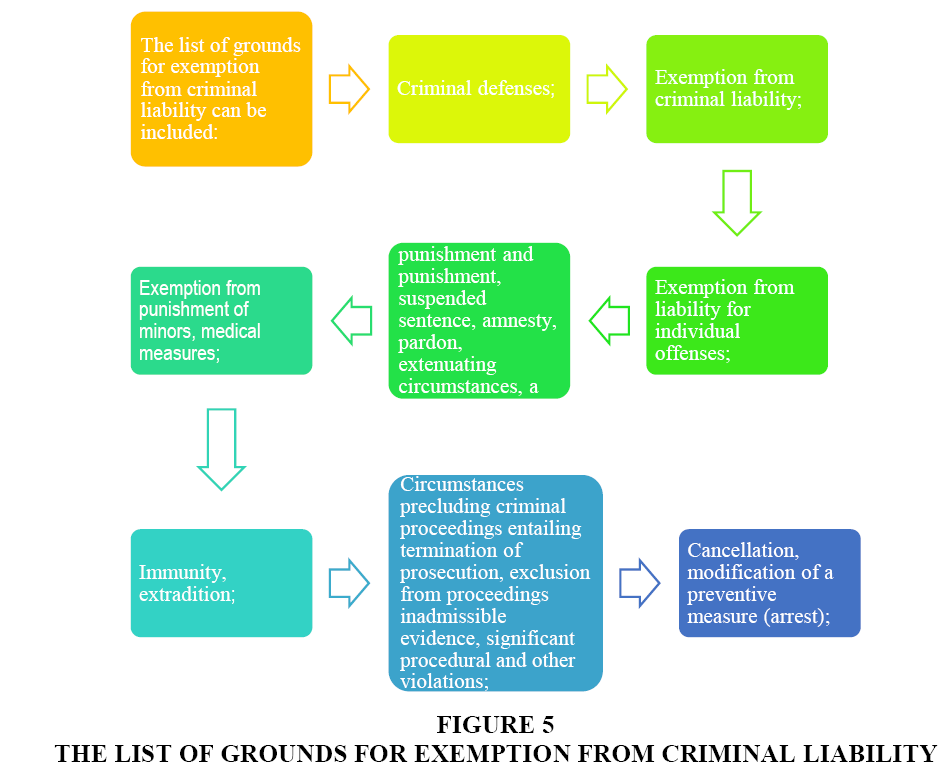Research Article: 2018 Vol: 21 Issue: 1
Some Issues of Exemption from Criminal Liability on the Existing Criminal Code of the Republic of Kazakhstan
Gulmira T Onayeva, Bolashak Academy
Aytugan Zh Abdizhami, Bolashak Academy
Akylbek T Kabzhanov, Bolashak Academy
Lazzat M Zhunusova, Bolashak Academy
Abstract
The content of the institute of exemption from criminal liability is a legally enforceable right-grounds and conditions for exemption from criminal responsibility which are a set of essentially encouraging criminal law applied in cases where there is no need to resort to repressive measures. In any research it is necessary firstly to understand the used terms. The accuracy of the terminology means, first of all, that each concept has its own term and one term defines one concept. Legal terminology issues received considerable attention in the legal literature. Legal scholars rightly associate it with the overall objectives of enhancing the effectiveness of legislation in the fight against crime and strengthening the legality in the country. These positions should be approached to clarify the content of the concepts “base” and “condition” from release.
Keywords
Criteria, Conditional Sentence, Amnesty, Pardon, Extenuating Circumstances.
Introduction
A variety of types of exemption from criminal responsibility of their legal nature and the application of exemption from criminal responsibility leads us to the question of typology or classification of exemption from criminal liability grounds. The classification factor is always careful study of an institution: Its laws, features, legal nature and opportunities for improvement (Kelina, 1994). The content of the institute of exemption from criminal liability is a legally enforceable right-the grounds and conditions for exemption from criminal responsibility, which are a set of essentially encouraging criminal law applied in cases where there is no need to resort to measures of repressive nature (Figure 1) (Blinnikov, 2001).
In the Russian language and science under the base generally understood as “an essential feature, for which distributed phenomenon, the concept” (The Criminal Code of the Republic of Kazakhstan, 2014), the condition is defined as a “fact of which anything depends” (Info graphics). The term “grounds for exemption from criminal liability” refers to the requirements contained in the law necessary in order to release the person from criminal responsibility.
Reason-the concept of broad, multi-faceted. In all cases, you should find out that it belongs to a particular phenomenon. Dictionary of Russian language Ozhegova in one case, defines it as an essential feature, for which the distributed phenomena, concepts (“On judicial practice…”). In the philosophy of “base” is understood as a necessary condition, which is a prerequisite for the existence of any events (consequences) and serves as their explanation (Dulatbekov, 2000).
A.S. Shlyapochnikov considers these circumstances to “objective criteria”; G.B. Wittenberg referred to them as “preconditions” release; THEM. Galperin-”a set of legal conditions” (Grachev and Ermakova, 2009); Vaksyan called “methods” reasons (Vaksyan, 2000).
Such diversity in the name of the conditions of release, in our view, is partly due to underestimation of the values of individual author’s terminology in law. In this regard, noteworthy remark Kudryavtseva that insufficient attention to the terminology, the lack of common understanding of the categories makes it difficult not only to research but also practical activities of a lawyer, prevent the use in the fight against crime. It seems that the scientist-experts in the field of criminal law should begin to develop single precise terminology on the content and application of criminal law (Kudryavtsev, 1969).
Legal terminology issues received considerable attention in the legal literature. Legal scholars rightly associate it with the overall objectives of enhancing the effectiveness of legislation in the fight against crime and strengthening the rule of law in the country (Shilov1996). Russian dictionary gives this definition: “The base-an essential feature for which distributed phenomena, concepts; reason, a good reason” (Rogova, 1998).
Methodology
Semantically, the “condition” and “preconditions”-essentially the same thing. For example, in the dictionary of the Russian language the word “premise” is explained as a precondition for anything (Rogov, 2002).
Previously, Article 8 of the RSFSR Criminal Code in 1926 established a common foundation for all crimes exemption from liability (punishment): The action, which was at the time of the crime, it was socially dangerous, it is not punishable if the act or the offender at the time of the investigation of the case or the consideration of it in court ceased to be socially dangerous (Luhtinand & Luhtina, 2001). In the current legislation the first ground of exemption from criminal liability is recognized crime of minor or moderate severity (Part 1 of Art. 65, Art. 68, Part 2 of Art. 70 and Part 1 of Article 83 of the Criminal Code).
Analysing Hegel's thesis “Everything has its sufficient reason.” IN AND. Lenin stated bluntly: “Needless to add: A good reason. Lack not has reason” (Figure 2) (Luhtin & Luhtina, 2005).
In the theory of criminal law there is no common approach with respect to aggregate the necessary bases and conditions, allows us to take a positive decision on the release of the offender from criminal responsibility (Shargorodskii, 1973).
According to Boytsova and Kropacheva theoretical interpretation of the exemption grounds of criminal responsibility has undergone a number of changes. The first stage of development is characterized by the search for the base unit, peculiar to a particular type of exemption. Over time, the fore the concept of multiplicity and individuality of reasons in respect of each type of release. By the early 70's due to the systematic study of the institution as a whole liberation attempt was made to isolate the base common to all kinds of liberation.
Fighters and Kropachev believe that in formal legal terms, the legal basis of liberation is really criminal law itself or rather the totality of the conditions defined by law as necessary for a particular type of exemption. But any formal basis (and the problem of the liberation of the bases was immediately placed as the problem of isolating and determining the grounds specified in the law) in cognitive terms is not a value, because they do not give new knowledge of the object (Boizovaand & Fighters, 1992).
Some researchers on the exemption from criminal liability are considered that the exemption from criminal liability can only occur when there are multiple grounds. This view is held by Kelina identifies two grounds for exemption from criminal liability “exemption from criminal liability may only be used in the simultaneous presence of both circumstance-small degree of social danger of the crime committed and the small degree of public danger of the person guilty” (Kelina, 1994). Kelina believes that the doubts about the fact that “under the ground in science refers to an essential feature, upon which the phenomena, concepts, reason, reason enough.” However, this statement does not show the differences between the bases from the other circumstances necessary for the application of a norm (Kelina, 1994).
As rightly emphasizes Kovalev, the construction of two circumstances in the base rank is incorrect. “The base may be one, because if something is taken by itself is not enough to serve as a basis, it cannot be called the base” (Kovalev & Vaskov, 1972). Another definition proposed base Wittenberg, “the basis of exemption from criminal liability is a set of prerequisites, which are defined by law for the respective form of liberation” (Vittenberg, 1970).
It specifies the grounds for exemption from criminal liability as follows is shown in Figure 3. From the point of view considered Krivochenko and Barbash, “on the basis of exemption from criminal liability is to be understood a conclusion about the possibility of reform and reimplementation of stateless criminal responsibility” (Figure 3) (Krivhenko, 2009).
Close on the content point of view, are Melnikova, Vorobyeva believes that the reason provided for this standard kinds of liberation is the decision of the investigating authorities and the court about the possibility of reform and re-face without the use of punishment (??lnik?v? & B?r?v?v?, 2001).
Chugai and Dubinin see grounds for exemption from criminal liability is that crime does not represent a great social danger and the perpetrator of the crime, also represents a major public threat and can be fixed without the use of criminal penalties (Chuga?v & Dubinin, 1981). The same can be noted in the analysis of determining the Zhunusova, believes that the grounds for exemption from criminal responsibility may be a small degree of public danger is released and the possibility of correcting or re it without punishment (Zhunusov, 2005).
Results and Discussion
Common types of exemption from criminal responsibility, as a rule, apply optional (Boizova & Fighters, 1992). So, Baranov proposed the following classification of the grounds for exemption from criminal liability. Because in some cases, exemption from criminal liability is the right investigative and judicial authorities, but not the obligation (Zhunusov, 2005), even if all the necessary formal prerequisites for taking such a decision and in other cases, the legislator obliges the exemption from criminal liability, the grounds of this release is offered classified into: Discretionary; peremptory. Also Baranov, offers and other classifications of liberation grounds of criminal responsibility: Main; subsidized; subjective; objective; the conditional (temporary); unconditioned (final).
We share the view expressed Skibitskaya that the unconditional exemption from criminal liability the final and the subsequent behaviour of the released law does not impose conditions. In this regard, the exemption from criminal liability is unconditional. Unconditional release is only possible if the offender does not pose great danger to society and his correction is possible without serving the sentence. When unconditional release of important law gives assumptions release, clearly specifying them. The same position is shared by Golovko, Alekperov & Tkachevsky, expressing his opinion in favour of the expediency of the classification in the conditional and unconditional types of exemption from criminal liability.
In addition, Alekperov, suggests that: “It would be advisable that the rules of the General Part of the Criminal Code that allow a compromise with the guilty in exchange for a confession, reconciliation with the victims, the elimination of the harmful consequences of the offense, grant conditional suspension of the perpetrator criminal liability so that he after his release from criminal liability, two or three years, felt over an invisible sword of criminal law, clearly aware that this sword immediately fall on his head if he violates the conditions of his release from criminal responsibility” (Alikperov, 2001).
This view is shared by a relatively Krivochenko. He suggests the possibility of the resumption of criminal proceedings, to attract a person to criminal liability for the act contains the elements of a crime, the responsibility for which he has been released, if a person after his release does not fulfil the requirements stipulated by the criminal law (Krivochenko, 1983).
Fedorov, Filimonov, analysing the classification proposed by Brainin, came to the conclusion that “is fundamentally wrong and is in contradiction with them to develop the same views on the concept of criminal liability and its foundation. The failure of this position from the point of view of the socio-political lies in the fact that all citizens who have not committed a crime shall be exempt from criminal liability. From the point of view of legal it is consistent not only because criminal law in all cases means the exemption from criminal liability only perpetrators of a crime, i.e., in the presence of a crime as the sole foundation of criminal responsibility (Braynin, 1967).
In our opinion, the most reasonable, logical consequence of the analysis of the current legislation appears to the following classification of the grounds and conditions for exemption from criminal liability (Figure 4).
Conclusion
In order to comply with the law in the implementation of this provision the legislator limits the scope of the discretion of law enforcement officials for the release of criminal responsibility certain circumstances characterizing the base and conditions. It seems to us that the basis of application of exemption from criminal responsibility, but may be the fact that defines the essence of this rule, the appropriateness of its existence. Circumstances, accept the base release should answer the question of why this exemption applies.
The above leads us to conclude that the grounds for exemption from criminal liability for the item. Art. 65,66,68,70, 78, 83 of the Criminal Code is the ability to reform and re-face without the use of criminal penalties. It is because the purpose of education and correction can be achieved without the implementation of the most rigorous form of liability-criminal, the law gives law enforcement agencies the right to release a person who has committed an act containing elements of crime, from its penal consequences.
In addition, the list of grounds for exemption from criminal liability can be included (Figure 5).
References
- Alikperov, H.D. (2001). Exemption from criminal liability. Moscow.
- Blinnikov, V.A. (2001). Circumstances precluding criminality, the criminal law of Russia. St. Petersburg.
- Boizova, ?.I. & Fighters, A.I. (1992). Deprivation of liberty as a form of punishment. In: Criminal Law at the modern stage: Problems of crime and punishment. St. Petersburg.
- Braynin, ?. (1967). Criminal law and its application. Moscow: Legal Literature.
- Chuga?v, A.P. & Dubinin, ?.?. (1981). Grounds for referral of the case of the crime in comrades. Moscow: Nauka.
- Grachev, Y.V. & Ermakova, L.D. (2009). Comment to the criminal code of the Russian Federation. Avenue.
- Kelina, S.G. (1994). Exemption from criminal liability as a legal consequence of committing a crime. In: Criminal Law: New Ideas. Moscow.
- Kovalev, ?.I. & Vaskov, P.?. (1972). Causation in the soviet criminal law.
- Krivhenko, L.N. (2009). Actual problems of criminology and forensic examinations. Moscow.
- Krivochenko, L.N. (1983).Classification of crimes. Kharkov: Publishing House at Kharkov University.
- Kudryavtsev, V.N. (1969-1978). Great soviet encyclopaedia. Moscow: Soviet Encyclopaedia.
- Lecnievcki-???t?r?v?, ?.?. (1999). Differentiation of criminal responsibility, theory and legislative practice. Moscow.
- Luhtin, Y.I. & Luhtina, E.Y. (2001). On the classification system of penalties. In: Collection of scientific works. “Bolashak”.
- Luhtin, Y.I. & Luhtina, E.Y. (2005). On improvement of the structure of a criminal record. Scientific-Practical Conference, Karaganda: Bolashak-Baspa.
- M?lnik?v?, Yu. & B?r?v?v?, ?. (2001). 21st century medical science: From ideas to new technologies. Proceedings of the All-Russian Scientific-Practical Conference, Moscow.
- Rogov, I.I. (2002). Humanization of the criminal policy of the Republic of Kazakhstan, its influence on the reform of the penitentiary system, Conceptual approaches to the further development of the penal system, Almaty.
- Shargorodskii, M.D. (1973). Punishment, its goals and effectiveness. Leningrad.
- Vaksyan, A.Z. (2000). The release of a citizen from criminal liability and penalties. Citizen and Law, 3, 56.
- Vittenberg, G.B. (1970). Questions of exemption from criminal liability and punishment using measures of social pressure. Irkutsk.
- Zhunusov, B.G. (2005). Criminal policy problems. Karaganda.
